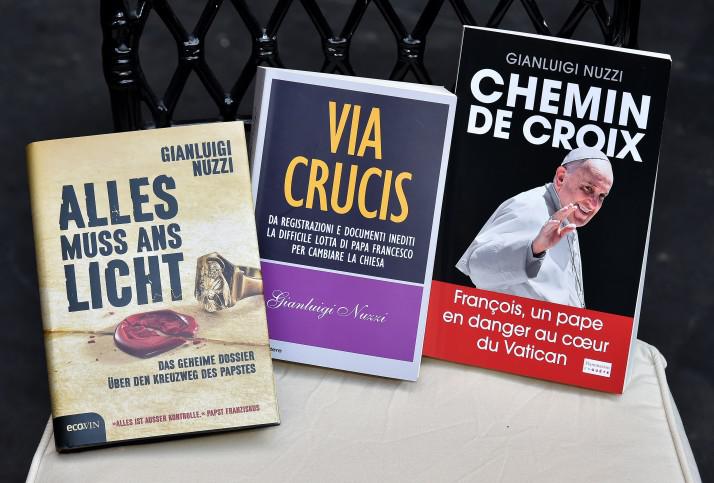|
New tales of priestly avarice rock the Vatican
By Silvia Marchetti
The Holy See is about to be rocked by a second “Vatileaks” scandal. The publication of two books Thursday — “Via Crucis” by Gianluigi Nuzzi and “Avarizia” by Emiliano Fittipaldi — promises to expose new evidence of fraud and misdoings in the Oltretevere, as Romans call St. Peter’s kingdom beyond the Tiber River. The books appear to be linked to this week’s arrests by Vatican police of Spanish clergyman Monsignor Lucio Angel Vallejo Balda, secretary of a special commission set up by Pope Francis to examine the Vatican’s finances — known by its acronym COSEA — and Francesca Chaouqui, an Italian PR woman who was dubbed the “social media guru”of the Holy See. They are suspected of leaking to journalists classified Vatican documents, including recordings of private conversations of the Pope, spiritual leader of the world’s one billion Roman Catholics, and information about Vatican finances. Chaouqui, who collaborated with investigators, has been released, while the cleric remains in custody. Both face up to eight years in jail. “Via Crucis” was written by a reporter who was involved in the first “Vatileaks” scandal in 2012 that cast a shadow over the papacy of Joseph Ratzinger, who as Pope Benedict took the historically unprecedented step of resigning in 2013. In his book, Nuzzi highlights the internal fight being waged by Benedict’s Argentine successor Francis, who was born Jorge Mario Bergoglio, against excessive Church spending. “Expenditures are out of control … there are traps. If we can’t keep under control the money, which is visible, then how can we look after the souls of the faithful, which are invisible?” he quotes Bergoglio as saying in a moment of private distress. “Avarizia” (“avarice”) is a snapshot of the Vatican’s financial fraud based on confidential documents obtained from the COSEA. “I have documents coming from various sources including the COSEA committee, the IOR (the Institute for the Works of Religion, the Vatican bank) and the Vatican prefecture,” Fittipaldi told POLITICO in an interview. “The greatest bombshell is that the Vatican is still working as a profitable merchant bank — the Church of the Poor, strongly wanted by Pope Francis, is far away from being created,” he said. In an excerpt published Tuesday in L’Espresso magazine, Fittipaldi alleges that the former Vatican secretary of state Cardinal Tarcisio Bertone used part of a €200,000 fund destined for a foundation for sick children to fund the redecoration of his lavish apartment, while a German bishop — who was removed last year — spent €31 million on a makeover of his palace in Limburg. The Church also bought luxury flats in the capital’s historical center worth €4 billion which are leased to VIPs, while Rome struggles to find housing for the influx of migrants, according to the book. “Avarizia” tells of prelates living in 400- to 600 square-meter studios with panoramic terraces overlooking Rome’s monuments, or building private retreats in lush Holy See estates with expensive furniture. Some regularly travel business class and one cleric is reported to have rented a private helicopter for €24,000 to fly from Rome to Basilicata, in southern Italy. Fittipaldi recounts senior priests making shopping trips to designer boutiques and holding lavish gala dinners of tuna and red prawn carpaccio at the capital’s most exclusive restaurants. More allegations concern money donated by the faithful via “Peter’s Pence” which has been invested in funds and bank accounts worth €400 million and is used by the Roman Curia for personal expenses and private trips. The author said the Church bought shares in oil companies involved in environmental disasters and paid for lawyers used in beatifications and canonizations. The Vatican’s only response so far has been an official statement describing the actions of those who leaked the material as “divulging confidential documents [which] is a crime under the criminal code of the Vatican City State.” “It should be said clearly once again on this occasion as in the past, that they are the result of a serious betrayal of the trust placed in certain individuals by the Pope, and, as far as the authors are concerned, of an operation to draw advantage from a gravely unlawful act,” the statement read. “Publications of this kind do not contribute in any way to the establishment of clarity and truth, but rather to the creation of confusion and partial and tendentious interpretations. We must absolutely avoid the mistake of thinking that this is a way to help the mission of the Pope.” In a television interview Nunzio Galantino, head of the Italian Episcopal Conference, described the leaks as “an attack on the Church. I don’t know who, but someone is frightened by the renewal process brought forth by Pope Francis.”
|
.
Any original material on these pages is copyright © BishopAccountability.org 2004. Reproduce freely with attribution.
